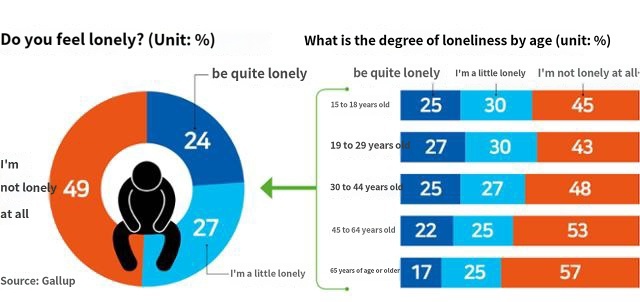
About a quarter of humans (excluding China) who currently coexist on Earth feel “significant loneliness.” This loneliness was particularly noticeable among young people who seemed to be actively communicating with the outside world through SNS.
According to Gallup, a U.S. pollster, on the 31st, 24% of people around the world said they felt “very, fair” and 24% said they felt “a little lonely.” The survey was based on the results of a survey of 142 countries around the world. However, China was excluded from the survey.
By age, 17% of senior citizens aged 65 or older felt lonely, the lowest among the comparative age groups. On the other hand, 27% of young adults said they felt “very, quite lonely.” In addition, “feeling a little” was the highest among all age groups at 30%. Gallup analyzed, “Although each country’s government policies to reduce people’s loneliness are mainly focused on the elderly, it is found that young people feel more lonely.”
There was little gender difference in feeling lonely. The ratio of men (24%) and women (24%) was the same for the answer that they felt “very or quite lonely.” However, Gallup said, “In terms of the number of countries, 79 countries had a high rate of female loneliness and 63 countries had high male loneliness. This means that there is a significant gender gap in some areas where the proportion of male loneliness is high,” he added.
However, Gallup decided to release detailed findings such as how different the depth of loneliness varies from country to country and how connected individuals are to society later. “This study of loneliness is the first step toward improving mental health and well-being life around the world,” Gallup said.
The survey results, which show that young people feel more lonely, draw attention in contrast to young people actively communicating with people around them using SNS. According to the Korea Information and Communication Policy Institute’s “Social Network Utilization Trend and Behavior Analysis,” the SNS usage rate of those in their 20s was the highest at 82.3 percent among all age groups, followed by those in their 30s (73.3 percent) and those in their 40s (55.9 percent).
On the other hand, some argue that the causes of loneliness vary, especially by age. According to a study published in 2020 by Maastricht University in the Netherlands and a research team at the Limburg Public Health Service in Germany, young people (19-30 years old) are due to less meeting with friends, unstable employment conditions in their 30s and 40s, and health problems in their 50s and 60s. They say that the degree of loneliness is greatest when they feel isolated in society or escape from natural situations depending on age groups, such as graduation, employment, marriage, parenting, health and stable retirement.
SOPHIA KIM
US ASIA JOURNAL



